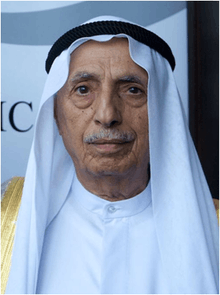Juma al Majid
Juma al Majid (born in Dubai, United Arab Emirates around 1930) is an Emirati businessman, political adviser, and philanthropist.[1] Al Majid is ranked among the Richest Arabs in the world.[2]

Early life and education
H.E. Juma Majid was born in Al Shandagah, Dubai in 1930.
Majid was introduced to the grocery business in Dubai through his uncle and continued in the same business for another two to three years until he met Mohammad Al Gaz in 1952. Al Gaz brought goods in Dubai from Kuwait and Bahrain, and Al Majid would help with the sales. In 1956, Al Qaz asked Al Majid to travel with him to Kuwait to trade in that lucrative market. The two used to take tobacco and Omani dry lime to sell in Kuwait and Bahrain and returned with goods like fabric and watches — from Switzerland and France — to sell in Dubai. The business expanded to Pakistan, India and across the Arab world into Europe, as it began to attract the support of international brands planning to enter the then Trucial States. It was around that time that Al Majid formally launched his own companies, Mohammad & Juma Al Majid alongside Al Gaz's United Arab Agencies.[3]
At the beginning of the fifties, he participated with his colleagues: Mr. Humaid Al Tayer, Abdullah Al Ghurair, Nasir Rashed Loutah, and with consent of Sheikh Rashid bin Saeed Al Maktoum in the establishment of the first charitable society to help the needy of Dubai, so they established two secondary schools, one for boys in Bur Dubai, called Jamal Abdul Nasser Secondary School, the second for girls in Bur Deira, called Amna Secondary Schools.
The partnership between Al Majid and Al Qaz lasted 11 years.
After the UAE Federation was formed, Al Majid left the gold business as the trade and development projects the country offered greater opportunities.
In 1974, Al Gaz and Al Majid began work on establishing a Pepsi factory in Dubai, the National Cement Company, and the Dubai Chamber of Commerce and Industry. He also diversified into the carpentry and décor business. The group has since diversified further into transport and logistics, construction, food and advertising. There is also an international investment company, Al Majid Investment.
Majid established the Islamic and Arabic Studies College in 1987 in Dubai.
In 1990, Al Majid, along with Al Gaz and other local philanthropists, established the Beit Al Khair Society, a charitable organization aims to aid the poor citizens, needy students, as well as offering cash or commodities to the victims of disasters.
In 1991, Al Majid realized the needs of scholars and researchers, especially those who are unable to obtain the necessary books, references and manuscripts, so he established a public library, afterwards it was developed to become a cultural organization, known as Juma Al Majid Center for Culture and Heritage.
Over time, Al Majid went on to secure franchise rights for other international brands — in engineering, automobiles, office furniture, communication and tyres — from companies like Samsung, Hyundai, Hitachi and many more. He is succeeded by his heir Khalid Juma Al Majid.
References
- Davidson, Christopher M. (2009). Dubai: The Vulnerability of Success. Columbia University Press. p. 156. ISBN 978-0-231-70035-1.
- "The World's Richest Arabs". Retrieved 23 November 2016.
- "A Life in Service". Gulf News. Retrieved 12 November 2016.